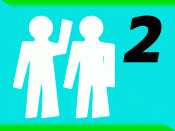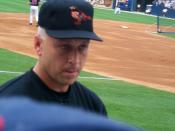Not Quite Human
Cloning is a process where an egg cell is taken, the nucleus removed and in the empty space, the nucleus of an adult donor cell is placed- ready to perform the normal stages of mitosis in the cells. This is a controversial, yet important subject plaguing our world's society today. The practice of cloning has begun within the last few years. Its first success was the now infamous sheep, Dolly. Dolly was "the first mammal to be cloned from an adult cell" (Gould, 224). Pigs, frogs and other animals have been experimentally cloned- that is to say that being "genetically identical to the cell of the organism from which it came" (Silver, 213). But the creation of Dolly did not involve "conception", as it is known socially and religiously. Widening the cloning scale to include human genetics is cause for debate.
" It embodies virtually everything about the powerful new technologies of molecular genetics and molecular biology that are coming back upon us.
It touches at the very core of what it means to be human. It touches upon the flow from generation to generation, which is obviously very controversial. And it touches upon our relationship with our genetics because obviously we're talking about altering the genetics of an unborn child." (Dr. Gregory Stock Human Germ line Symposium Report 3/20/98) Ethical and moral challenges aside, cloning is an incredible scientific advance that addresses the most pondered questions of creation and evolution. Cloning can have great implications on Science and Technology as it beckons to become the cure to inheritable disease and the end of infertility. Human germ line engineering emphasizes altering DNA that predisposes a person to life threatening diseases and thus, extending life expectancy. Who can conceivably argue against the elimination of AIDS, cancer and other...


